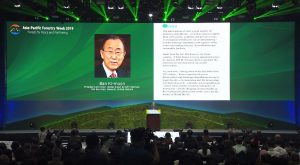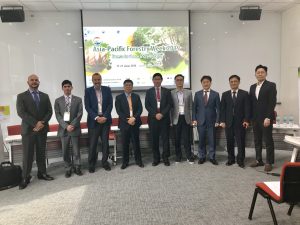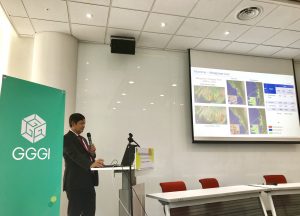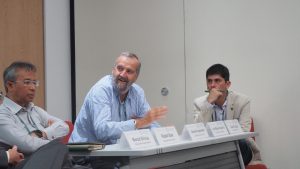
From June 17-21, GGGI took part in the Asia-Pacific Forestry Week (APFW), at the Songdo Convensia Convention Center in Incheon. The event, which was organized by the Food and Agriculture Organization of the United Nations (FAO) and the Korea Forest Service (KFS), provided a strategic platform to raise awareness and discussion on overall peatland management in the Asia-Pacific region and address GGGI’s global efforts to build a resilient environment. Participants were various actors from related fields, including leading scientists as well as key private sector actors.
At the opening of the conference former ROK Ambassador to the UN Mr. Kim Sook delivered Mr. Ban Ki-moon, GGGI’s President & Chair’s keynote speech at the Asia-Pacific Forestry Week 2019 on Tuesday, June 18, during which he said:
- Korea is a very appropriate place to convene APFW due to its record of successful reforestation following decades of deforestation and land degradation during the first half of the 20th century;
- Exciting and rapid technological advances in RE and energy storage are great to help reduce GHG but it is the forests and trees that absorb our CO2 gases;
- The tasks are too great for one country or org, and we need to work together across boundaries, sectors, disciplines.
Sustainable Forest Business Talks
 On June 19, GGGI and the Korea Forest Service co-hosted the “Sustainable Forest Business Talks” session, in order to build a dialogue on how to promote, replicate, and scale up private investment in forest business to ensure poverty reduction, local capacity building, and environmental sustainability.
On June 19, GGGI and the Korea Forest Service co-hosted the “Sustainable Forest Business Talks” session, in order to build a dialogue on how to promote, replicate, and scale up private investment in forest business to ensure poverty reduction, local capacity building, and environmental sustainability.
The moderator of the session was Luis Miguel Aparicio (GGGI), and the speakers/panelists include Nyi Nyi Kaw (Forest Department Myanmar); Sang-sun Ha (ECOEYE); Grahame Applegate (USC); Juan Chang (GCF); Hang-sok Kim (Dreamsharing); Dong-ju Yu (K.O.A); and Kang-baek Lee (Asia Fairtrade Network).
During the session, panelists discussed perspectives about sustainable forest business models that incorporate innovative partnerships and operational arrangements, and how to facilitate forest business for the local community. Grahame Applegate (USC), shared that “we need to focus on people’s livelihoods if we want any initiative to be successful”. Moreover, two key messages of the session were that, first, in order to bolster forest landscapes restoration, a subnational jurisdictional approach for REDD+ should be facilitated in alignment with the national level, ensuring cross-sectoral contribution towards NDC targets. Second, multi-stakeholder and cross-sectoral collaboration needs to be strengthened and innovative business models sought to improve local livelihood, conserve and restore forest and peatland ecosystems at the same time.
The panelists also provided the following actionable recommendations:
- Focus on setting up subnational jurisdictional implementation and accounting mechanisms in
alignment with national priorities - Foster collaboration through PPPs, community enterprises to develop and implement innovative
approaches for forest management and restoration to achieve more inclusive and long-lasting
impact.
 Going forward, international emissions trading represents an opportunity to support forest management and restoration, although clear rules and implementation mechanisms are still required, especially for Article 6 transactions to occur. During the session, Juan Chang (GCF) shared how “different mechanisms exist to avoid double counting, the simplest one is normally the advisable one”. REDD+ results-based payments, especially focused on subnational jurisdictional scope, is an imminent opportunity that brings support for on-the-ground implementation of forest restoration activities. Furthermore, PPPs represent a promising approach to generate more income to the local people, achieving mitigation and adaptation target at the national level, and technical-expert support at the international level.
Going forward, international emissions trading represents an opportunity to support forest management and restoration, although clear rules and implementation mechanisms are still required, especially for Article 6 transactions to occur. During the session, Juan Chang (GCF) shared how “different mechanisms exist to avoid double counting, the simplest one is normally the advisable one”. REDD+ results-based payments, especially focused on subnational jurisdictional scope, is an imminent opportunity that brings support for on-the-ground implementation of forest restoration activities. Furthermore, PPPs represent a promising approach to generate more income to the local people, achieving mitigation and adaptation target at the national level, and technical-expert support at the international level.
Although emission transactions are a live opportunity, lack of regulatory clarity and perception of burdensome process discourages private sector access to the carbon market. Policy certainty and government support are required to increase investment and positive reaction. Consistent MRV and accounting mechanisms are necessary to conciliate project-based, jurisdictional base and national carbon accounting. Collaboration between sub-national agencies and smallholders is strongly needed to increase impact. Community-based entrepreneurial/associative schemes bolster sustainability and ownership.
Innovation of Peatland Management under Changing Climate

On Friday, June 21, GGGI, the Ministry of Environment and Forestry (MoEF) of the Republic of Indonesia, the Forest for Life Indonesia (FFLI), and the Asia Forest Cooperation (AFOCO) collaborated to host the session on “Innovation of Peatland Management under Changing Climate”.
During the session, participants shared innovative approaches for measuring, monitoring, and reporting emission from forest and peatland and provided an update of research progress on the status of forest and peatland. The session sought to reinforce their importance in global carbon cycle and to national economies.
“In (Indonesia’s) land-use and forestry sector, 60% reduction in peat emissions will play a very important role in meeting our climate targets,” says Dr. Ir. Ruandha Agung Sugardiman, M.Sc., Director General of Climate Change of MoEF in his opening remarks. “Achieving this will require sustainable management and protection of peatland ecosystems, including peatland restoration of more than 2 million hectares until 2030,” he added.
 Peatland has attracted global attention due to its significant contribution to global carbon balance. Although its overall surface area is relatively small, i.e. only 3% including forested peatlands, these peatlands have carbon stock more than the tropical forests. Disturbance on these lands due to human activities such as agricultural expansion and drainage construction, peat mining, combined with
Peatland has attracted global attention due to its significant contribution to global carbon balance. Although its overall surface area is relatively small, i.e. only 3% including forested peatlands, these peatlands have carbon stock more than the tropical forests. Disturbance on these lands due to human activities such as agricultural expansion and drainage construction, peat mining, combined with
extreme climate manifestation has contributed to the degradation of about 65 million ha of peatland area globally. Emission resulted from these disturbances is very significance, reaching to about 3 Gt CO2 per year, or about 5% of the global carbon budget.
Peatlands also play an important role in economic development. Therefore, policies, strategies, and technologies for improvement of peatland management are crucial to enable achievements of global commitments to mitigate climate change, as outlined in the Paris Agreement. Many good practices have been implemented to manage the peatlands in sustainable ways. However, such practices have not been adopted widely as applying such practices also faces various challenges.
As Dr. Sugardiman conveys, the Indonesia session is expected to establish a solid commitment amongst stakeholders to work together in answering the many challenges of peatland management. “Addressing the issue of peat and climate change requires the involvement of all stakeholders. I hope that through today’s presentations and discussion, progress will be made, gaining a better-shared understanding of and commitment to the challenges of restoring, managing and protecting peatland ecosystems,” he said.